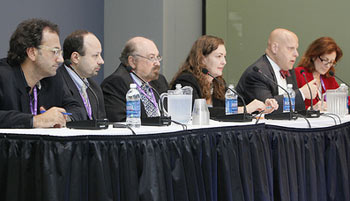
Privacy, Please panel session at The Cable Show 2011. From left to right: Jules Polonetsky (Future of Privacy Forum), Lou Mastria (Canoe Ventures), Paul Rubin (Technology Policy Institute), Maneesha Mithal (Federal Trade Commission), Daniel Weitzner (White House Office of Science and Technology Policy) and Moderator: Susan Israel (Comcast Cable Communications).
Policy talk turned to consumer privacy at the Cable Show as representatives of the FCC, White House, think tanks and Canoe Ventures came together to discuss the need for privacy protection for consumers. The Administration and Commission focused on ways to streamline privacy notices, make privacy policies more transparent, implement "do not track", and identify ways to make privacy easier for customers to understand.
Daniel Weitzner of the White House Office of Science and Technology commented that the goal is to allow consumers to understand how their personal information is being collected and used. A number of questions were raised including the definition of "commonly accepted practices", which have given some companies pause, and the difference in requirements between regulated an unregulated industries.
Paul Rubin of the Technology Policy Institute noted that the government changes are fairly significant, and he has seen no cost-benefit analysis to assess the burden on companies. Rubin noted that the legitimate use of personal data has never actually generated a consumer harm. There is, he says, no data to indicate that legal use is a problem. While he acknowledges that people don't want stuff known about them. He pointed out that it is possible for information to be known, but not by people. He says we are incapable of understanding that the "knowing" only occurs as aggregated in databases. Rubin went on to suggest that the government should spend less time regulating and more time educating people on how this information works and the fact that nobody sees the data. Drawing a clear line between legal use and illegal use, Rubin also noted that inadvertent data disclosure through hacking is a security problem, not a privacy problem.
Jules Polonetsky challenged Rubin's position and said it's not about harm. It seems, he says, that privacy has gone beyond a question of harm and what must be addressed is the value proposition. Consumers should be made to feel that they are in control, and that the data is in service of the customer's needs, rather than the company's. Polonetsky says the focus should be on data optimization, not data minimization.
************************
Michael Turk is a Partner in CRAFT | Media / Digital, a full-spectrum communications agency. Learn more about CRAFT at www.craftdc.com.